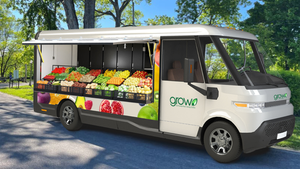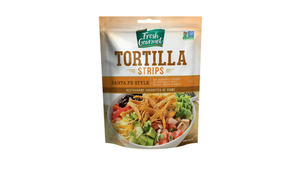A BOUNTY OF TEAS
Treasure troves of tea bags are being discovered in supermarket aisles. Following the success of multiflavored, ready-to-drink iced teas, tea bag manufacturers have introduced hosts of specialty teas in exotic flavors such as kiwi peach, black raspberry and orange spice. After becoming hooked on unusual flavors in the summer, many consumers are brewing up hot versions for the winter months.Other varieties,
November 13, 1995
RICHARD TURCSIK
Treasure troves of tea bags are being discovered in supermarket aisles. Following the success of multiflavored, ready-to-drink iced teas, tea bag manufacturers have introduced hosts of specialty teas in exotic flavors such as kiwi peach, black raspberry and orange spice. After becoming hooked on unusual flavors in the summer, many consumers are brewing up hot versions for the winter months.
Other varieties, such as peppermint, chamomile, licorice and green teas -- products that once were relegated to the shelves of health food stores and tea shops -- have become supermarket staples. To top it off, retailers say the additional varieties have not plundered the sales of traditional teas. Instead, they've brought new sippers to the category.
Tea sales also are being aided by the proliferation of flavored coffees, which are broadening the entire hot beverage category. Coffee shops are adding exotic teas to their menus and tea parlors are springing up in many large cities, further stimulating sales.
"Tea is a good category and the varietals are growing at a very quick pace," said a spokesman for A&P, Montvale, N.J., the company which began 136 years ago when its founder brought boat loads of tea from the Far East, packaged it and sold it to the masses for less than other merchants.
Now that A&P is one of the nation's largest supermarket operators, with stores under the A&P, Waldbaum's, Farmer Jack, Kohl's, Food Emporium and other banners, tea once again is a prominent part of the company's portfolio of private-label products. Its upscale Master Choice line offers 10 herbal teas and nine varieties of black teas to its customers, in addition to its America's Choice private-label standard teas.
"We have seen a very positive trend. We're adding new products on a regular basis. To a degree we are expanding the shelf space for tea to fit these new products in," A&P's spokesman said, adding that facings, but not stockkeeping units, of regular teas have been reduced in some stores.
"Our best-selling variety flavors are lemon, black currant and peppermint. In terms of black teas, best sellers are orange pekoe and orange spice. A key reason varietal teas have been growing is that there have been quite a few introductions of the bottled and canned ready-to-drink iced teas in flavors. Once a person tries those, they may become more interested in trying different varieties," the spokesman said.
"Some of the flavored and specialty teas, like those from Stash and Celestial Seasonings, are beginning to come along," said Pat Redmond, grocery buyer at Rosauers Supermarkets, Spokane, Wash. "They have been popular for quite a while, but they have been picking up year by year. Some of the catchy names, like chamomile, are also popular.
"In flavored tea bags, we find most of the growth is coming from items that are new and heavily advertised," said Phil Mannino, director of operations at Food Circus Supermarkets, Middletown, N.J.
Mike Shultz, senior vice president at Hughes Family Markets, Irwindale, Calif., said flavored and herbal teas offer retailers margins that are 5% to 10% higher than those of traditional teas.
"We are having some success with the flavored teas. They are merchandised within the category and shippers are used during promotional weeks. The flavored teas do offer better margins than the standard teas," said Al Young, category manager at Big Y Foods, Springfield, Mass.
"We have seen a slight increase in tea bag sales, which is due to herbal and decaffeinated. As a result, we have added additional SKUs in those areas. This year we anticipate an additional emphasis on the flavored, herbal and decaffeinated teas. That is a trend," said Emily G. Holdstein, senior vice president of Wonder Market Cos., Worcester, Mass.
According to Joseph Simrany, president of the Tea Council of the USA, a New York-based trade association, tea bags have been showing a growth rate of between 1% and 2% a year in the approximately $1.3 billion tea bag market.
"The growth rate of tea bags is very good because we're not seeing as much cannibalization to the specialty areas and ready-to-drink as you might think," he said. "Herbal teas have been showing steady growth, and we are getting a little bit higher degree of growth, about 2% to 4% per year, than the standard tea bag market, although it is on a much smaller base," Simrany said.
Of the $1.3 billion in sales, about $602 million was sold in supermarkets for the 52-week period ended July 16, according to Information Resources Inc., Chicago. IRI found supermarket tea sales to be relatively flat, edging up just 0.1% from the previous year.
Figures provided by A.C. Nielsen Co., Schaumburg, Ill., show Thomas J. Lipton Co., Englewood Cliffs, N.J., is the nation's largest marketer of tea with a 44.5% market share. It is followed by private label with a 17.5% share and Tetley, Shelton, Conn., with a market share of 13.1%.
"Our tea sales are up because of the increase in coffee prices," noted Young of Big Y. "For example, the General Foods International Coffees, with their higher retails and no promotion, cause the consumer to turn to an alternative, such as flavored teas."
"Last winter there was a temporary surge in hot tea sales because coffee was quite high in costs," said Holdstein of Wonder Market Cos. "But at the current price levels of coffee, we don't expect to see a repeat of that this year." But most retailers are expecting tea sales to be brisk this winter.
"For the winter months we're going to really illustrate that we have a great variety of tea," said A&P's spokesman.
"The variety teas are where the big growth is. Bigelow has a wide variety and we plan to promote them extensively this winter. They will have displays and prepack shippers," he added.
"We always do a big job with tea from November on through at least January. We usually have a pallet program of 100-count Lipton tea bags, which we promote with hot prices at the lowest possible cost," said Redmond of Rosauers.
Young of Big Y said, "We do not change our shelf merchandising plans for the tea category for the winter months. However, we do promote more often. This year we plan on promoting the specialty teas. We look at nonperformers and discontinue to make room for the fad types of flavors."
"Teas have not lost any business to coffee," Redmond added. "They have cut their own groove and they are continuing to proceed pretty much on plan. Tea is still a popular drink, more so with the 40 and over group. The younger crowd is really being wooed by the espresso, specialty and flavored coffees." "Although our best-sellers are still the standard 100-count boxes of tea bags, in our Rice Epicurean stores we carry more tea than anybody in town," said Vern Buford, head grocery buyer at Rice Food Markets, Houston.
About the Author
You May Also Like




